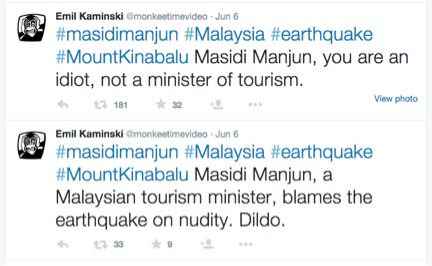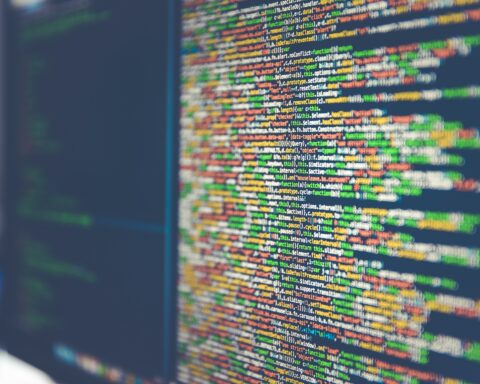Two siblings from Saskatchewan are among 10 climbers who have been barred from leaving Malaysia after they allegedly took nude photos atop Mount Kinabalu in the country’s eastern state of Sabah.
A magnitude-6 earthquake rocked the mountain on the morning of June 5. Sixteen people have died while two are still missing.
As the highest peak in the country, Sabahans consider Mount Kinabalu to be sacred; it is a point of pride for many Malaysians. The native Dusun community, in particular, believe the mountain is the final resting place of their ancestors.
As a Malaysian, it is unclear to me what the country’s government hopes to discover in its investigation of the climbers’ alleged crime.
Emotions ran high when the climbers’ nude photos on Kinabalu Park Facebook page were brought to light. Reports say they were blamed by many, including Deputy Chief Minister of Sabah, Joseph Pairin Kitingan, for causing the earthquake.
Kitingan told the media that the climbers had “broken native laws”; a number of the climbers have been arrested and are currently being held for investigation.
The Divided Response
Reactions to the incident are divided into two camps. Many feel the climbers had violated the sanctity of the mountain and disrespected the people who consider it sacred.
Others felt the locals’ beliefs were founded in superstition and that the climbers should not be held to those beliefs.


One climber named Emil Kaminski – a Canadian national who claims to have been part of the “mountaintop photo shoot” – has been particularly vocal. He reportedly called Malaysia’s Tourism Minister, Masidi Manjun, an idiot for linking the earthquake to the nude photos.

As a Malaysian, it is unclear to me what the country’s government hopes to discover in its investigation of the climbers’ alleged crime. Even more unclear is what the government hopes to achieve by penalizing them.
The affront is rooted in the climbers’ insensitivity and disregard for what local Sabahans consider sacred. If that’s the case, an extended stay in a Malaysian lockup, coupled with a fine, sounds like poor remedy.
Nonetheless, the climbers’ conduct clearly showed poor judgement that needs to be addressed. Their guide allegedly scolded them for breaking away from the group in order to take the photos. According to one report, the guide was told to go away while the climbers continued.
There seems to be a prevailing attitude of superiority towards local customs and immunity from the repercussions of violating those customs among Western travellers.
Kaminski’s pointedly incendiary social media posts on the matter further reflect the callous attitude I have personally encountered among young travellers from the global West to developing countries.
There seems to be a prevailing attitude of superiority towards local customs and immunity from the repercussions of violating those customs among Western travellers. As in this case, the feelings and sentiments of locals are up for ridicule or outright dismissal when they collide with those of travellers or tourists.
The Learning Lesson
The fact that two Canadians are caught in this quagmire is symbolic of ongoing conversations around pluralism and diversity in Canada. The intersection where the two beliefs cross paths is a key learning point, particularly for Canada where the immigrant population is increasingly informing the fabric of its mainstream society.
News reports and anecdotal accounts of discriminatory behaviour towards minority faith groups, people of colour and Aboriginal communities show that we still have a long way to go in learning to treat one another with respect.
From the Indian Residential School system’s attempt to “civilize” Aboriginal children to the recent “Zero Tolerance for Barbaric Cultural Practices Act” aimed at stopping polygamy and child marriages, there is a clear underlying presumption of minority beliefs and cultures as inferior and of less value compared to Western, mainstream cultures.
Respect, in this instance, doesn’t necessarily mean we have to adopt the beliefs of others. It simply means acknowledging and honouring them to the best of our ability without compromising our own principles.
Appreciation for different beliefs can only come from mutual learning and respect through conversation. Respect, in this instance, doesn’t necessarily mean we have to adopt the beliefs of others. It simply means acknowledging and honouring them to the best of our ability without compromising our own principles.
More importantly, respecting the beliefs of others certainly doesn’t mean antagonizing them when we’re in disagreement or are shown to be in the wrong.
Punishing the climbers will probably increase their dislike for local Sabahan customs and beliefs. And to say their behaviour was not wrong because it aligned with their own culture and upbringing is nothing short of cultural, if not Western, imperialism.
The better route would be for both camps to turn this confrontation into an opportunity for conversation.
Since the parties involved are sufficiently tech-savvy enough to metaphorically tear each other down on Twitter, why not tap into social media’s power to transcend geographical boundaries and engage each other in meaningful dialogue instead?
Lin Abdul Rahman is a Malaysian-born freelance journalist and social justice advocate based in Toronto, Ontario.





